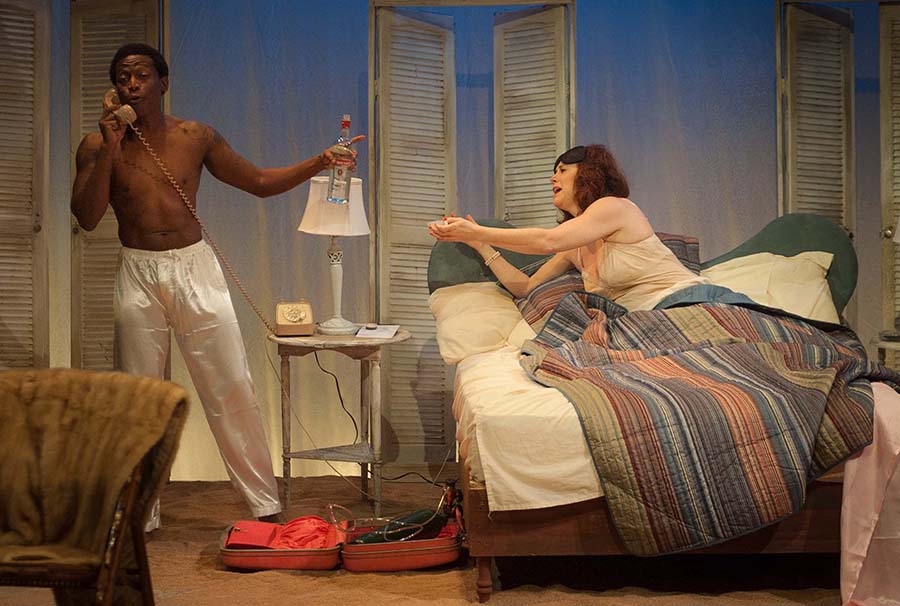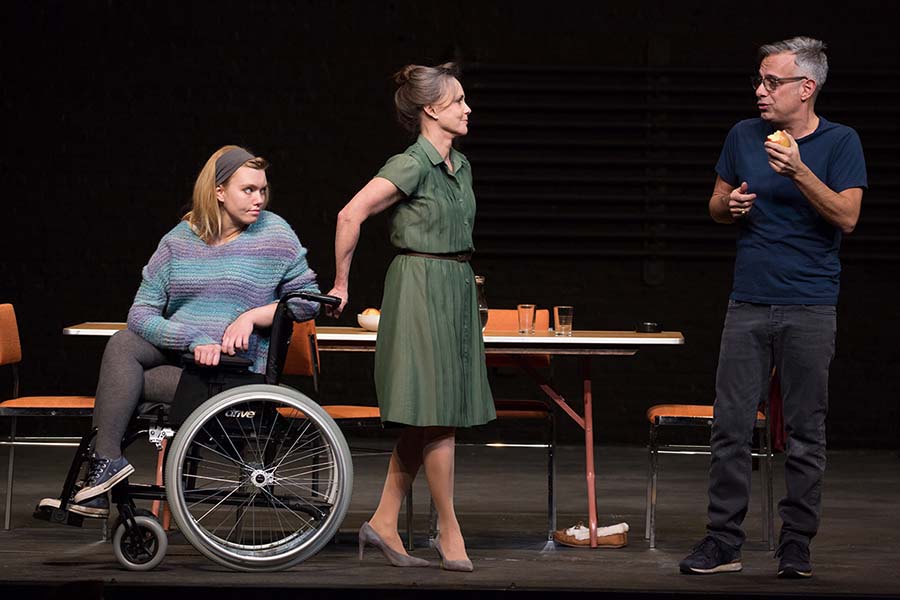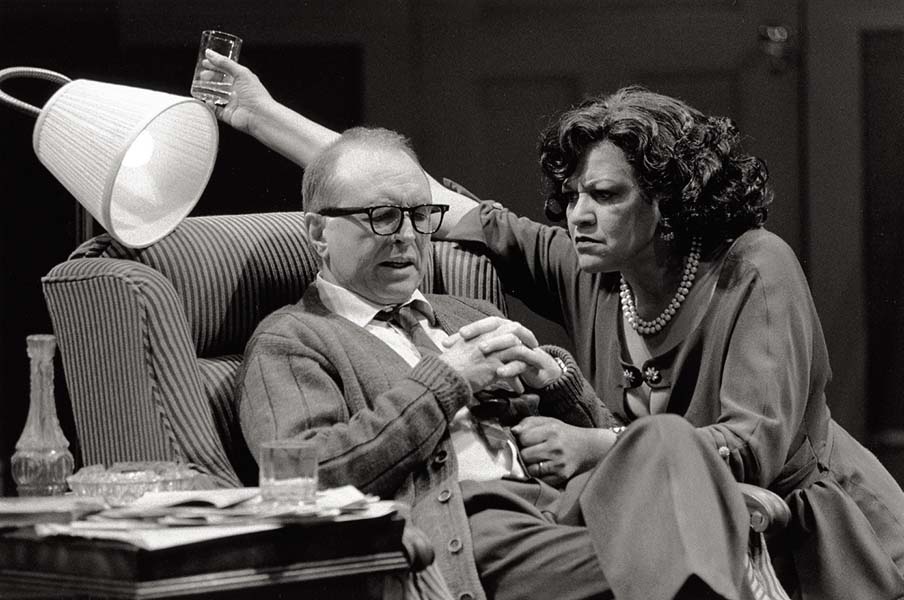It all began quietly enough. Director Michael Streeter planned to present a production of Who’s Afraid of Virginia Woolf? by Edward Albee in September at the Shoebox Theatre in Portland, Ore. But last week, after submitting his cast list for approval by the Albee estate, he was told that they wouldn’t issue him a license for the play. So Streeter responded in that quintessentially 21st-century way: He wrote an angry Facebook post.
“I am furious and dumbfounded. The Edward Albee Estate needs to join the 21st century. I cast a black actor in Who’s Afraid of Virginia Woolf? The Albee Estate called and said I need to fire the black actor and replace him with a white one. I refused, of course. They have withdrawn the rights.” (In fact, considering that rights for Virginia Woolf were never granted to Streeter, the word “withheld” may be more correct.)
Within 24 hours the post went viral, with The Guardian and Jezebel picking up the story (and NPR and The New York Times following suit). Over the weekend many weighed in on social media, with some supporting the Albee estate’s decision to preserve Albee’s work exactly as he intended, others decrying the decision as racist and discriminatory, and still others called for reexamination of copyright laws. (Today the Dramatists Guild released a statement affirming the primacy of author’s intent.)
Unlike some other authors’ estates, which don’t always require casting be approved, the Albee estate—following the lead of Albee himself, who only died last fall—is fairly stringent in its requirements before granting a license.
“The Albee estate requires professional producers to submit production proposals, which include intended venue, casting, and other artistic elements,” said Abbie Van Nostrand, the director of corporate communications at Samuel French, who handles the licensing of Albee’s plays. When Albee was alive, he was notoriously particular about how his plays were presented and who could perform in them; it’s even been reported that he requested approval of the heights of the actresses cast in Three Tall Women.
Streeter has explained that he wanted a black actor to play the part of Nick, a young biology professor who is the foil to the much older George. “This was a color-conscious choice, not a colorblind choice,” explained Street in a subsequent Facebook post. “I believe casting Nick as black adds depth to the play. The character is an up-and-comer. He is ambitious and tolerates a lot of abuse in order to get ahead. I see this as emblematic of African Americans in 1962, the time the play was written.”
Because the text and character description refers to Nick’s blonde hair and blue eyes, Streeter also asked to make small changes to the text. As the actor he wanted to cast, Damien Geter, is bald, he hoped to “change the term ‘blond’ to ‘bald’ and ‘blondy’ to ‘baldy’ or ‘curly.’”
Sam Rudy, the publicist for the Edward Albee estate, defended the decision to withhold the rights in a letter sent to Streeter, in which he wrote: “Mr. Albee himself said on numerous occasions when approached with requests for non-traditional casting in productions of Virginia Woolf that a mixed-race marriage between a Caucasian and an African-American would not have gone unacknowledged in conversations in that time and place, and under the circumstances in which the play is expressly set by textual references in the 1960s.”
On the other hand, Sam French’s Van Nostrand told me that the role of Martha, George’s wife, can be cast non-traditionally. And indeed she has been, in a 2002 production at Oregon Shakespeare Festival. Said Rudy: “Every casting choice is considered separately and thoughtfully by the estate.” Today the estate released a statement through Rudy that pointed out that “the vast majority of roles in Edward Albee’s almost 30 plays can and should be cast diversely. The estate is eager to encourage as much diverse casting as possible,” pointing to the casting of Sophie Okonedo and Archie Madekwe in the current the West End production of The Goat, or Who Is Sylvia?
You can’t blame an artist for trying, and you can’t blame an estate for saying no. In thinking through these issues, one thing is clear: A playwright and/or their estate has the right to approve or deny a license to their plays for any reason. It is their right, as Dramatists Guild co-executive director Ralph Sevush wrote on Facebook: “Unlike directors and screenwriters, authors have no pension, no health insurance, no collective bargaining…All they have is ownership of their work and approval over its production for a small blip of time on the cosmic clock. You don’t have to like their decisions, but it’s part of the social compact with our dramatists that those decisions be accepted, since we offer them little else.”

In writing about a similar casting issue with playwrights Katori Hall and Lloyd Suh in 2015 (white actors were appearing in roles explicitly written as characters of color), I wrote that “the rights of the playwright trump the rights of the directors/producers.” I stand by that, and I will continue to stand up for the rights of playwrights to dictate what should be done with their work.
But when the story about this Albee casting controversy broke, I was already working on a piece about non-traditional casting in plays by Tennessee Williams. This now happens with some frequency, as Williams’s estate does not require casting approval before issuing licenses. Just this season, there have been three instances of non-traditional casting in the U.S.: Asian-American actor Linda Park played Maggie the cat in Cat on a Hot Tin Roof at Antaeus Theatre in Los Angeles; black actor Martin Bradford played Chance in Sweet Bird of Youth at New Orleans’s Southern Rep; and Madison Ferris, an actor with muscular dystrophy, played Laura in The Glass Menagerie on Broadway.
None of these plays changed Williams’ written words. But in at least two of those instances, it wasn’t the estate that had a problem with the productions—it was the self-appointed Williams purists. In a notorious review of Menagerie in the New York Observer, Rex Reed deplored Ferris’s performance of Laura “as a pathetic and deformed social reject. Based on Tennessee’s real sister Rose, Laura is written as a shy, fragile girl with no self-reliance and no social skills. Ferris makes her a pitiful, grotesque invalid.”
Aimee Hayes, Southern Rep’s artistic director, said she’s received similar letters from patrons saying exactly that after seeing the theatre’s production of Sweet Bird of Youth, and some critics also raised eyebrows at the forefronting of an interracial relationship, given the play’s period. “What a shame the director thought she needed to improve Tennessee’s play!” wrote one audience member. “She set up a totally implausible scenario for ’50s Mississippi. She butchered his work and his characters. The actors did their best to try to salvage this travesty.”
“It’s funny to me that people want to see a play exactly like it was done 75 years ago—to what end?” Hayes wondered. “I think what’s amazing about the play is the way Chance is treated in the ’50s is the way black men in our society are still viewed. It hasn’t changed at all, and it seems like it always ends up at the end of a gun.”
Bradford, who played Chance, articulated one of the most persuasive rationales for this sort of casting practice: opportunity.
“That’s a beautiful thing about Tennessee Williams: He writes for the ne’er-do-wells, the little guys,” said Bradford. “Just being a black person and knowing what it’s like to be a minority and to be ostracized, even though there’s not many black characters in his work, there are certain things you can identify with. But then it makes you go, ‘Oh dang, why don’t we have very many black characters?’”

So some authors estates are more permissive than others. For every Albee or Beckett (whose estate has fought the casting of women in roles he originally wrote for male actors), there are estates like Williams’s, or Arthur Miller’s, or Rodgers & Hammerstein’s, which has approved a production of Oklahoma! at Oregon Shakespeare Festival for 2018 that will include some same-sex couples. Setting aside the legality of playwrights’ rights, who is right and who is wrong?
Theatre is a living, breathing, collaborative art form. To me, that means that every production is different depending on who’s working on it. An emphasis on a syllable here, an arched eyebrow there, can drastically change the interpretation of a line. And it changes depending on the audience in the room. As audiences diversify, as actors, directors, creators diversify, what should be done with older works written in more homogeneous times?
I think that question goes hand in hand with a few others: What kind of American theatre do we want? Do we want an American theatre where actors who are underrepresented can play roles previously denied to them? Or do we want classics to remain almost entirely the province of white, able-bodied actors?
Seen from one point of view, the term of 70 years after an author’s death (applicable to works published after 1977), or 95 years from the date of publication (applicable to works published between 1923 and 1977), is a “small blip of time,” as the Guild’s Sevush puts it. Seen from another point of view, though, those long terms represent whole lifetimes. Knowing that I will be 70 before I’ll be allowed to see an all-female Waiting for Godot is depressing (unless the Beckett estate changes its mind, or is compelled to do so, as a court in Rome ruled in 2006).
There’s also the question of whether the core meaning of these plays hinges on the characters and the actors playing them being white, in much the way August Wilson’s work is specifically about blackness or some of O’Neill’s is about Irishness. Some may argue that Virginia Woolf is indeed a commentary on whiteness in a particular time and place, but many see the themes of marriage and ambition as universal. That may be a debate for Facebook.
But reinvention is how these works will survive beyond their lifetimes, let alone ours; just ask Shakespeare. I loved Sam Gold’s Menagerie, which closed yesterday. It made me feel empathy for Laura, a character for whom I had previously felt a mix of pity and frustration. While we’ve seen countless stories about young, helpless, non-disabled women, what I had not seen was a story about a disabled young woman who has to figure out how to live in a world that doesn’t want to accommodate her; I winced in sympathy for Ferris each time she was forced to go up and down the stairs to and from the stage, her body hitting each step with a painful thud. It may not be what Williams “intended,” but seeing a performer like Ferris on a Broadway stage was indescribably powerful.
Who do we harm when we preserve classics in amber? We harm actors of color, actors with disability, female actors, any underrepresented group. While the American theatre is in the process of righting longstanding practices that have excluded people of color, disabled people, and LGBTQ+ folks, it’s still true that the vast majority of canonical classics revived on our stages are by white men, and are written with predominantly white roles. Until that wrong is righted, until there’s more equitable representation onstage, it simply makes sense that these works by white writers should be available to a wider range of actors and interpreters. Yes, that means that the works of August Wilson and other writers of color should continue to give priority to actors and interpreters of color; but the works of Williams, Albee, and other frequently revived white authors should be expanded to consider non-traditional interpreters. It’s not about limiting, it’s about expanding.
And hey, if you want to see a “traditional” staging of Albee, Williams, Miller, etc.—well, like streetcars, another one will come along soon. If they’re as good as Chekhov and Shakespeare, they should be able to stand the rethinks and recastings those authors are regularly put through.
Of course, if directors and producers want to save themselves the headaches, there’s another simple solution: Find contemporary plays by people of color that feature meaty roles for actors of all types. There are plenty of living, talented playwrights who can use the exposure. Speaking for myself—though I suspect I’m not alone in this—I would rather watch a new play by a living writer, featuring a diverse cast, than another all-white production of Virginia Woolf.
Streeter reports that he’s currently in discussion for an alternate play to put in the empty slot at the Shoebox. Maybe he should follow Southern Rep’s lead: Next month the theatre will produce Father Comes Home From the Wars by Suzan-Lori Parks.
“White culture is so stupid,” exclaimed an exasperated Hayes. “The culture is shifting, you’re outnumbered. Be open to it. How can you be a part of this? Facilitate an opening. Also, what’s your role in being part of a wider culture. Not a whiter culture, a wider culture! And what does that mean?”


